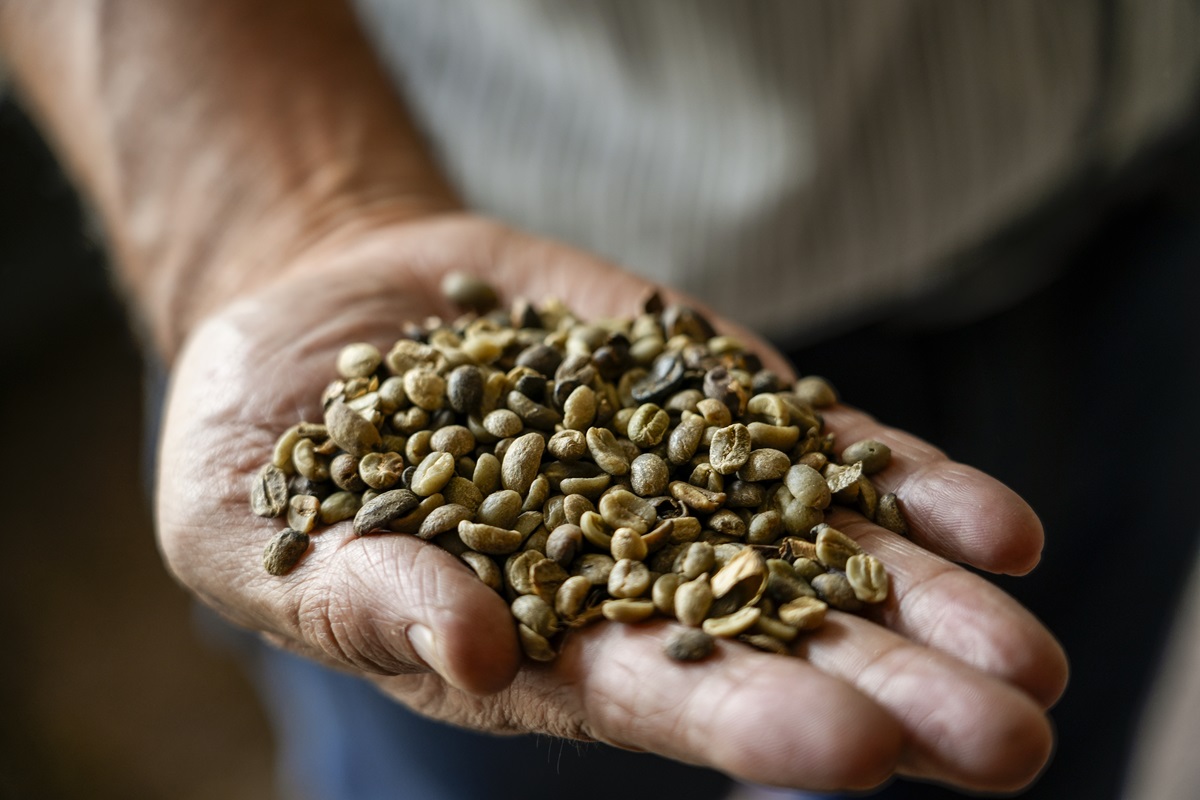FROM ANTIOQUIA AND HUILA (COLOMBIA) — Nestled in the mountains around the municipality of Andes, in Colombia’s Antioquia department, La Arboleda coffee farm is certified by Rainforest Alliance, the world’s leading agricultural certification program. During harvest, around 500 workers are needed to pick every bean produced on one of the country’s largest farms. When Repórter Brasil visited the site in January this year, it found that workers were sleeping in makeshift sheds and using bathrooms without showers.
In January, the reporting team traveled through the coffee-growing zones of Antioquia and Huila—two of the country’s main coffee-producing regions—interviewing dozens of workers, farmers, researchers, and representatives from industry associations and civil society. The findings are detailed in the report The World’s best coffee? Poor accommodation, long working hours and informality in Colombia’s coffee harvest, published Friday (27th) and available in English, Portuguese and Spanish.
Each year, up to 330,000 temporary workers, known as recolectores, take part in Colombia’s coffee harvest. The country is the third-largest producer globally, behind Brazil and Vietnam.
Experts warn that this high level of production does not always come with labor rights protections. When Repórter Brasil visited La Arboleda, it found bathrooms where water came straight from a pipe, with no temperature control. The farm had 12 dormitories, each housing between 60 and 80 workers. One contained 37 bunk beds. It was in this overcrowded shed that pickers rested before returning to the fields the next day.




None of the temporary workers at La Arboleda had formal employment contracts, confirmed both the manager and the farm owner, businessman Rigoberto Luis Franco Arroyave.
In addition to Rainforest Alliance certification, Arroyave stated that the farm held several other social and environmental certifications, including 4C (Common Code for the Coffee Community) and C.A.F.E. Practices, Starbucks’ sourcing program. In theory, such certifications ensure that farms have been audited and deemed to follow “good practices” for sustainability and labor.
Rainforest Alliance acknowledged that La Arboleda is certified under its program. According to the organization, a 2024 audit had already identified non-compliance regarding contracts and housing. After being informed of Repórter Brasil’s findings, Rainforest Alliance announced it would conduct a new audit at the site.
4C stated that La Arboleda was certified between June 2023 and August 2024 but is no longer active in the program.
Starbucks responded that La Arboleda is not currently part of its C.A.F.E. Practices program. The company did not specify when the farm left the program, only noting that verifications occur every one to two years.
The full statements from the certifiers can be read here.
Besides the interviews conducted in January, the reporting team later contacted the owner of La Arboleda for comments on working conditions but received no response before publication. The space remains open for future statements.
Poor ventilation and improvised kitchen
Another farm visited was Finca Los Naranjos, located in the mountains near the town of Salgar, also in Antioquia. In Spanish, finca refers to a smallholding or family farm. A sign outside the shed where coffee beans are bagged shows it is certified by Fairtrade International, one of the world’s most recognized certification labels.
The property had two dormitories housing 35 to 40 people in total. Both featured bunk beds in dark, poorly ventilated rooms. There were no lockers for personal belongings. For a bit of privacy, some workers hung coffee sacks as makeshift curtains.
“The main characteristic [of worker housing in the sector] is too many people in too little space,” said Robinzon Lizarazo, a social sciences professor at Surcolombiana University in Huila and a researcher of rural labor relations in Colombia.


Finca La Siberia is located in Palermo, Huila—Colombia’s top coffee-producing region. With six hectares, it requires up to 15 temporary workers during harvest. Coffee grower Lucas Quintero Vargas, 62, manages the property alone and said his production is also Fairtrade-certified.
The housing at La Siberia featured thin mattresses on bunk beds, with no bed linens. Two additional beds were placed on the porch, sheltered from the wind only by cloth. The three available bathrooms had neither showers nor doors. Workers cooked their meals over a wood-burning stove in an improvised kitchen.
No housing standards
Fairtrade International outlines a range of social criteria, but none related to worker housing conditions for seasonal laborers are required from small-scale producer organizations like cooperatives. This includes La Siberia and Los Naranjos, which, according to farm managers, supply their certified production to the Huila Departmental Coffee Growers Cooperative and the Salgar Coffee Growers Cooperative, respectively.
Small producers also hire seasonal labor during harvest. At Los Naranjos, the farm administrator said up to 150 workers are employed per season to harvest the 300,000 coffee trees.
Fairtrade International told Repórter Brasil that it “recognizes the need to do more to ensure that the benefits of Fairtrade reach workers on smallholder farms, including temporary, seasonal, and migrant laborers.” However, the organization noted that “many farmers earn very little and sell only a fraction of their crops under Fairtrade terms, so requiring them to provide worker housing is a significant challenge.”
Fairtrade also explained that smallholder farms linked to cooperatives are not individually certified. Therefore, further investigation is required “to confirm that the farms identified as ‘Finca La Siberia’ and ‘Los Naranjos’ are owned by cooperative members certified by Fairtrade.”
The organization said it had forwarded the reported cases to FLOCERT, an independent auditor responsible for verifying compliance with Fairtrade standards. “Each allegation is reviewed on a case-by-case basis. If violations are found, we will take appropriate action,” Fairtrade stated.
The owners of Los Naranjos, with whom Repórter Brasil spoke during the visit, could not be reached for follow-up. Vargas, from La Siberia, acknowledged that the housing on his property needs improvement and said he plans to upgrade it in August, after the first semester’s harvest ends.
Paid by output, close to the national minimum wage
Paid per kilo harvested, Colombian coffee pickers often work long hours to increase their earnings during the harvest season. In January, when Repórter Brasil visited La Arboleda, recolectores were earning 1,400 Colombian pesos per kilo of coffee picked, equivalent to approximately USD 0.36 at the time. This could amount to a monthly income of about USD 588.
In Colombia, the national minimum wage is 1.4 million pesos, equivalent to around USD 358. However, earnings above that threshold are not guaranteed for coffee pickers. Without a minimum wage established in a formal contract, rural workers’ incomes vary greatly. They may harvest less coffee if, for example, it rains for several days in a row or if they become ill.
A study published in 2022 by the International Labour Organization (ILO) in Colombia pointed out that coffee pickers paid by output may even earn below the national minimum wage. “This dependence on individual effort, measured in kilos picked, can result in workers selling their labor during the off-season in exchange only for food and lodging,” the report says.
“The minimum wage is set by law, but it is not always enforced,” adds Fabio González, director at the Ministry of Labor in the Antioquia department.
*Repórter Brasil’s investigation was conducted with the participation of members of Voces por El Trabajo, an organization that researches working conditions across various sectors of the Colombian economy, and was supported by Coffee Watch.



